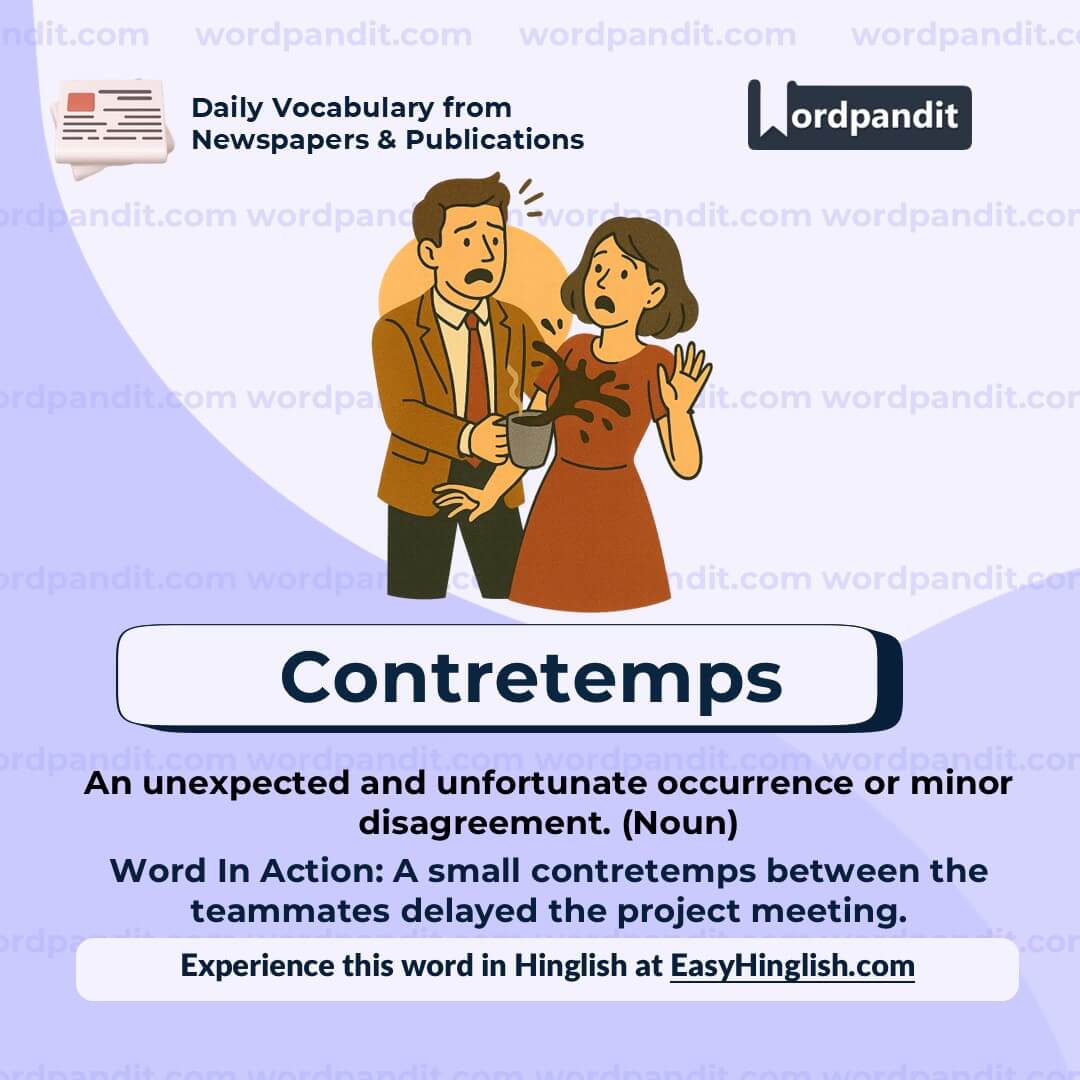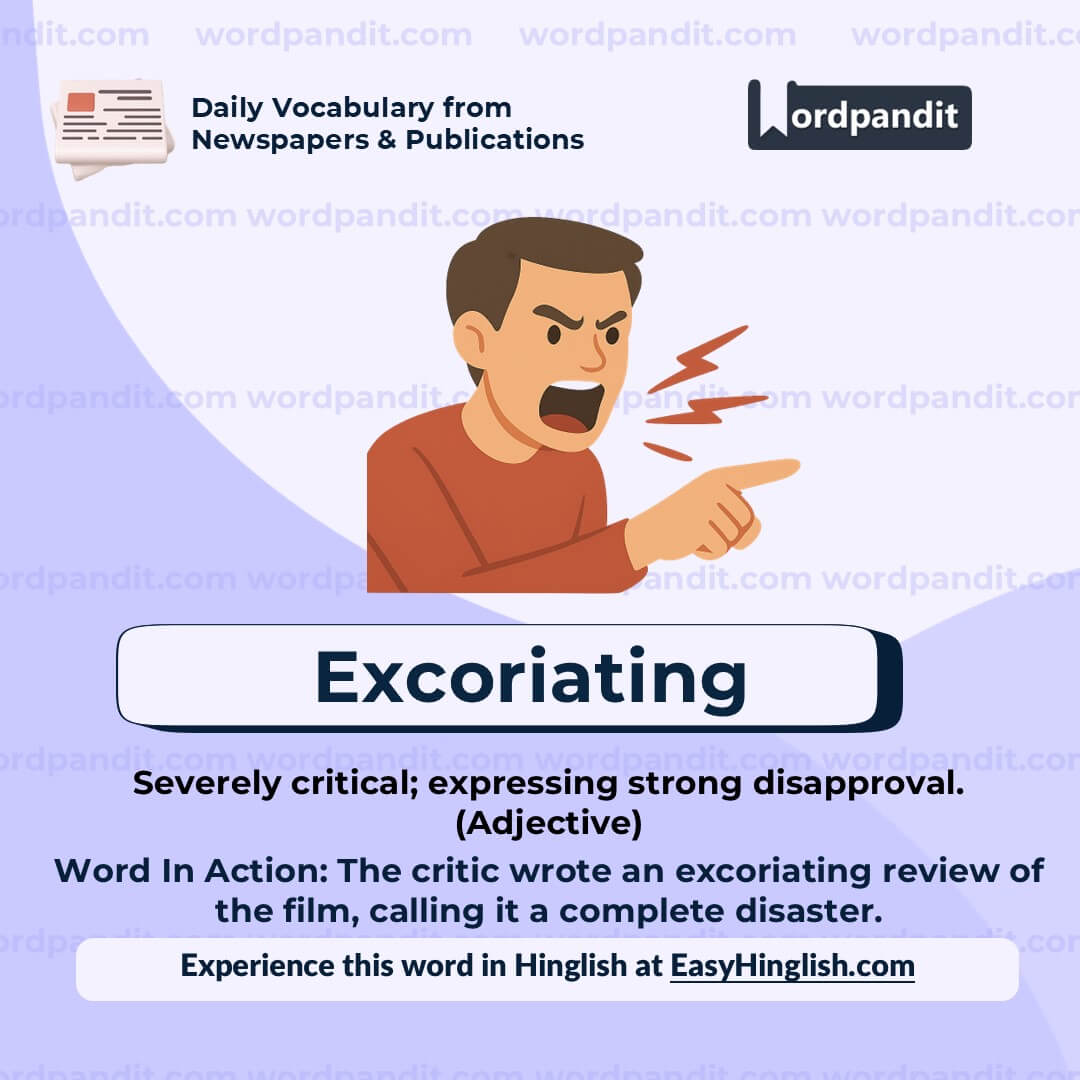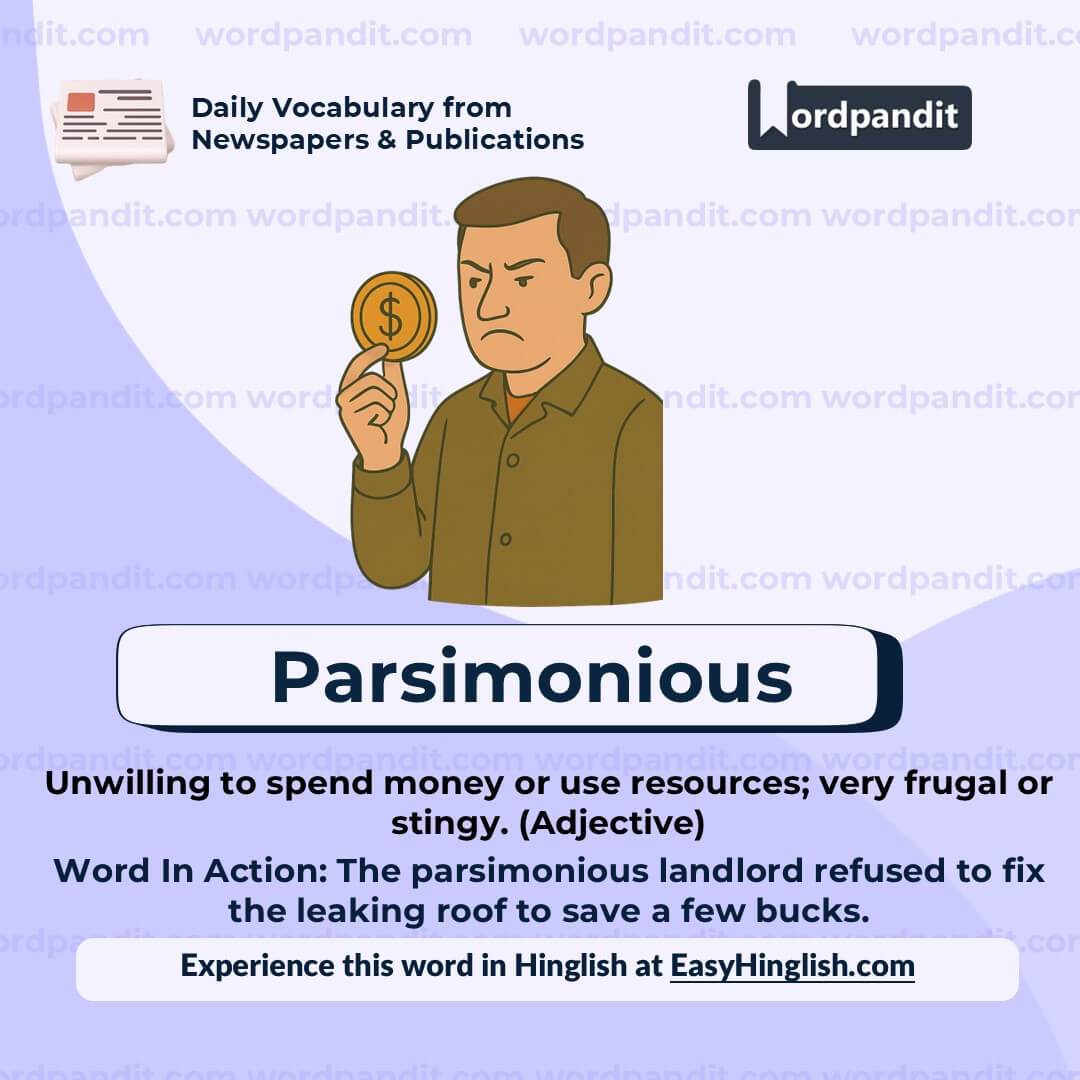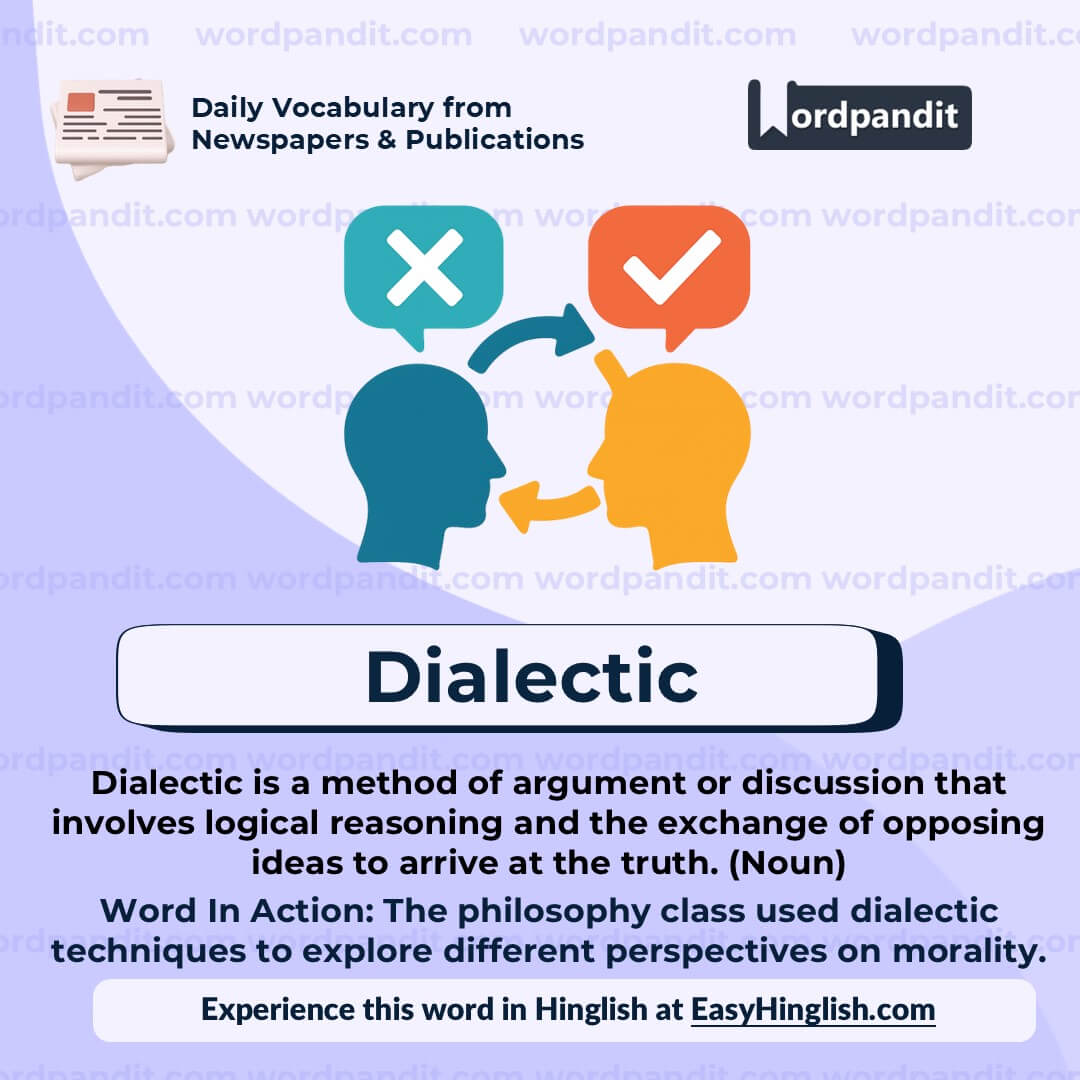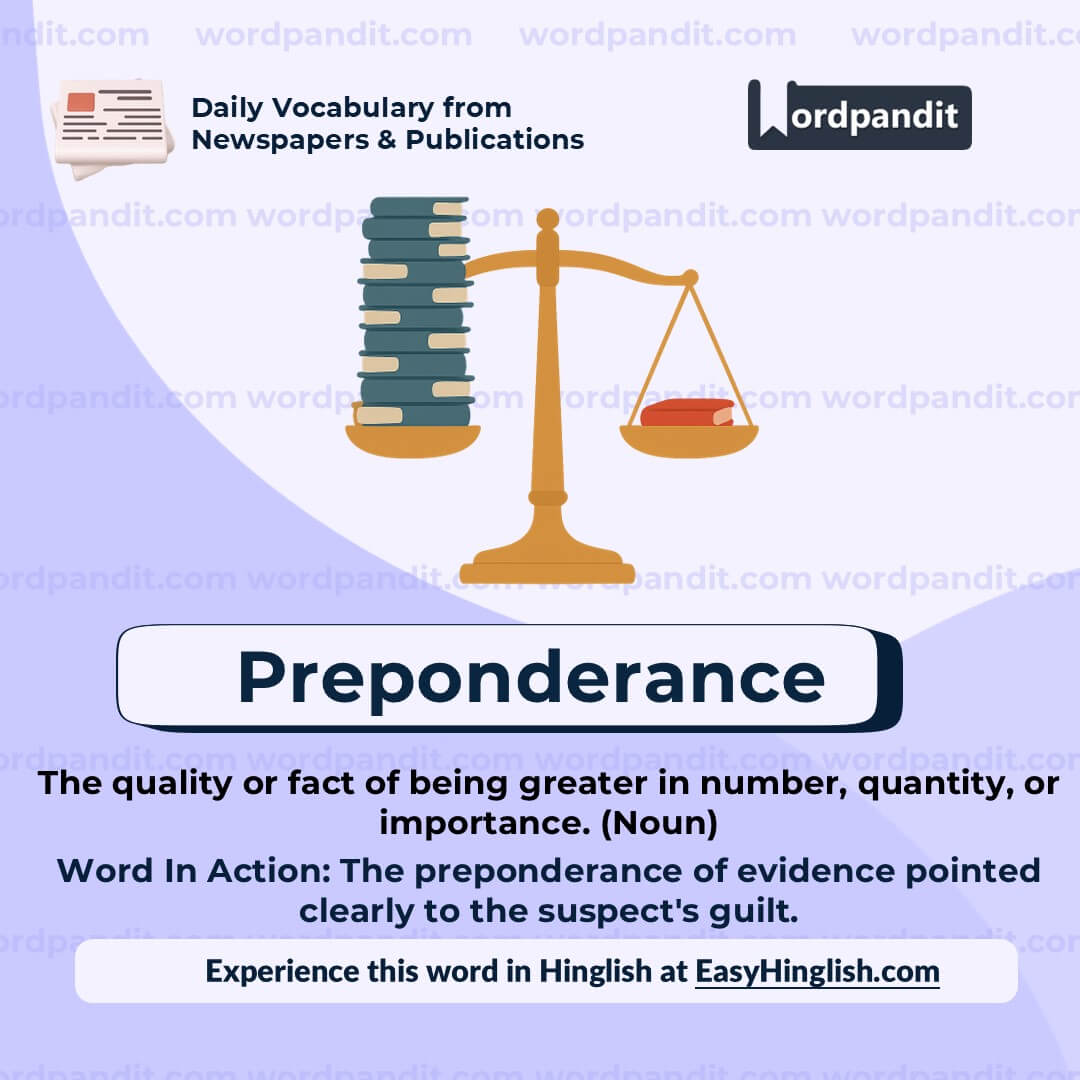Daily Vocabulary from Indian Newspapers and Publications
Welcome to Wordpandit’s Indian Vocabulary Hub
At Wordpandit, we understand the importance of staying rooted in the local context while expanding your language skills. This section focuses on enriching your vocabulary with words and phrases drawn from India’s leading newspapers and publications, ensuring you're learning vocabulary that is practical, relevant, and uniquely Indian.
Why Indian Sources Matter
We believe that the best way to master any language is by immersing yourself in local content. That’s why we carefully curate vocabulary from top Indian publications, including:
- The Hindu
- The Times of India
- The Economic Times
- Hindustan Times
- Live Mint
- The Indian Express
- And many others...
Stay Updated, Stay Relevant
With daily updates from Indian news sources, you’ll be consistently learning words that reflect the trends and shifts in Indian society and culture. Our focus is to provide vocabulary that enhances your understanding of the language in an Indian context.
How Wordpandit Supports Your Goals
Whether you’re preparing for exams, aiming to improve your professional communication, or simply want to stay connected with the latest Indian vocabulary, Wordpandit is here to guide you every step of the way.
Learn with a Practical Approach
Our interactive learning methodology includes real-world examples, engaging activities, and context-specific usage to ensure that every word becomes part of your active vocabulary.
Dive into Indian Vocabulary Today!
Why Choose Wordpandit?
Practical Learning: Focus on words you'll actually encounter in real-world reading, enhancing your comprehension and communication skills.
Diverse Content: From current affairs to scientific breakthroughs, our varied sources expose you to vocabulary across multiple domains.
Effortless Integration: Make Wordpandit a part of your daily routine. Just a few minutes each day can significantly boost your lexicon over time.
Your Path to Vocabulary Mastery
- Visit our Daily Vocabulary section regularly
- Explore new words and their usage in context
- Practice incorporating these words into your own writing and speech
- Track your progress as your vocabulary expands
Start Your Journey Today
Embark on your vocabulary enhancement journey with Wordpandit. By consistently engaging with our daily posts, you'll build a robust vocabulary that serves you well in academic, professional, and personal contexts.
Remember, a word a day keeps linguistic limitations at bay. Make Wordpandit your daily companion in the quest for vocabulary excellence!
WORD-1: Contretemps
Context:
"The diplomatic contretemps between the two nations threatens to derail years of carefully cultivated economic cooperation." - Mathrubhumi
Explanatory Paragraph:
"Contretemps" refers to an unexpected and unfortunate event or disagreement that disrupts normal proceedings, especially in social or diplomatic settings. It’s a refined way to describe an awkward conflict, dispute, or minor clash that creates embarrassment or tension. In the context of diplomacy, a contretemps can escalate into larger issues if not handled tactfully.
Meaning: An unexpected and awkward or unfortunate incident, especially a disagreement or clash (Noun)
Pronunciation: kon-truh-tahn
Difficulty Level: ⭐⭐⭐⭐ Advanced
Etymology: From French *contretemps*, meaning "against time" or "inopportune occasion"; from Latin *contra* (against) + *tempus* (time)
Prashant Sir's Notes:
This word often shows up in high-level journalism, literature, or diplomatic discourse. Think of it as a polite way to say “embarrassing conflict.” Not for everyday use—but perfect for serious and nuanced conversations.
Synonyms & Antonyms:
Synonyms: mishap, quarrel, dispute, squabble, altercation, run-in
Antonyms: agreement, harmony, consensus, peace, accord
Usage Examples:
- The minor contretemps during the wedding reception was quickly smoothed over by the hosts.
- His political career nearly ended after a public contretemps with a fellow senator.
- The manager handled the contretemps between the team members with remarkable diplomacy.
- Despite the contretemps at the press conference, the event concluded on a positive note.
Cultural Reference:
"In international relations, even a small contretemps can trigger disproportionate consequences—like the spark that lit World War I." - Paraphrased from a diplomatic history lecture
Think About It:
Can a single contretemps change the course of history or relationships? How can we learn to defuse such moments before they escalate?
Quick Activity:
Write a short paragraph describing a social or workplace contretemps you’ve witnessed (real or imagined), and how it was resolved.
Memory Tip:
Think of “contre” as “conflict” and “temps” as “time” — a “contretemps” is a conflict that comes at a bad time.
Real-World Application:
In international affairs, HR situations, or corporate negotiations, being able to recognize and navigate a contretemps diplomatically is a valuable skill. It helps maintain relationships even during awkward clashes.
WORD-2: Excoriating
Context:
"The Supreme Court delivered an excoriating judgment on the government's handling of environmental clearances for the controversial project." - The Hindu
Explanatory Paragraph:
"Excoriating" is used to describe a severely critical or scathing verbal or written attack. When someone or something is excoriated, they are being harshly judged, often with the intention of expressing strong disapproval. In the context of law or media, an excoriating report or judgment leaves no room for doubt—it openly condemns the subject.
Meaning: Harshly critical or severely scathing (Adjective)
Pronunciation: eks-KOHR-ee-ay-ting
Difficulty Level: ⭐⭐⭐⭐ Advanced
Etymology: From Latin *excoriare*, meaning "to strip the skin off"; from *ex-* (out) + *corium* (skin, hide). The word evolved from a physical sense of abrasion to a figurative one—criticism that "tears into" someone.
Prashant Sir's Notes:
Use "excoriating" when you want to describe something that's not just critical but *ferociously* so. Think of editorials, court rulings, or speeches that completely tear down a subject with logic, evidence, and intensity.
Synonyms & Antonyms:
Synonyms: scathing, blistering, searing, damning, condemning, vitriolic
Antonyms: complimentary, praising, laudatory, approving
Usage Examples:
- The excoriating editorial left the administration scrambling for damage control.
- Her excoriating remarks during the debate left her opponent visibly shaken.
- The documentary offers an excoriating look at corruption within the healthcare system.
- The audit report was excoriating in tone, pointing out systemic negligence across departments.
Cultural Reference:
"His excoriating monologue on political hypocrisy became an internet sensation, sparking intense debate online." – Inspired by popular political satire shows
Think About It:
When is harsh criticism necessary, and when does it cross the line into being counterproductive?
Quick Activity:
Write a mock excoriating review of a fictional movie or book—make it harsh but constructive!
Memory Tip:
Think of “excoriating” as “EXTRA-scary rating” — when someone gives such a bad review or judgment, it practically "strips the skin" off the subject.
Real-World Application:
"Excoriating" is a go-to word in journalism, legal commentary, and academic critique when describing intense disapproval. It's useful when you're analyzing or reporting with a strong critical tone.
WORD-3: Parsimonious
Context:
"The budget has been criticized as parsimonious in its allocation for public health infrastructure despite the lessons of the pandemic." - Economic Times
Explanatory Paragraph:
"Parsimonious" describes someone or something that is extremely unwilling to spend money or use resources—essentially, being excessively frugal or stingy. In contexts like budgeting or policymaking, calling a decision "parsimonious" suggests that it may be so cost-conscious that it ends up being unhelpful or even harmful. It's often used in a critical tone, highlighting an unjustified level of tightfistedness.
Meaning: Unwilling to spend money or use resources; stingy or frugal to a fault (Adjective)
Pronunciation: par-sih-MOH-nee-uhs
Difficulty Level: ⭐⭐⭐ Intermediate
Etymology: From Latin *parsimonia* meaning "frugality, thrift", derived from *parsus*, the past participle of *parcere* meaning "to spare"
Prashant Sir's Notes:
Use this word to describe someone who’s not just careful with money, but almost too careful—often to the point of being unfair or impractical. It’s a good word for critiques in economic, political, or even personal financial discussions.
Synonyms & Antonyms:
Synonyms: stingy, miserly, tightfisted, penny-pinching, frugal (extreme)
Antonyms: generous, liberal, lavish, extravagant, openhanded
Usage Examples:
- His parsimonious nature made him calculate every single expense down to the last rupee.
- The company's parsimonious investment in safety measures eventually led to costly lawsuits.
- Despite being a billionaire, she was famously parsimonious when it came to tipping.
- Critics slammed the government’s parsimonious response to the education crisis.
Cultural Reference:
"Ebenezer Scrooge, the parsimonious protagonist of Charles Dickens' *A Christmas Carol*, eventually learns the value of generosity." – Classic Literature
Think About It:
When does frugality cross the line into being harmful or unethical? Is there a balance between being cautious and being parsimonious?
Quick Activity:
Write a sentence describing a public figure or fictional character known for being parsimonious. What were the consequences of their behavior?
Memory Tip:
Think: "Parsi-Money-ous" — Someone who’s very stingy or overly cautious with *money*.
Real-World Application:
"Parsimonious" is frequently used in economic reports, government critiques, and budgeting contexts to highlight overly tight financial control that may undermine progress or equity.
WORD-4: Dialectic
Context:
"The article explores the dialectic between traditional cultural values and modernization in rapidly developing urban centers." - The Wire
Explanatory Paragraph:
"Dialectic" refers to a method of examining and discussing opposing ideas in order to find the truth or reach a new understanding. Originally rooted in philosophy, especially in the works of Socrates, Plato, and Hegel, it involves a structured dialogue where conflicting viewpoints are explored to arrive at a synthesis. In modern contexts, it often describes a dynamic tension or interaction between two opposing forces—like tradition and progress—that together shape change and growth.
Meaning: A method of argument or reasoning through opposing ideas to arrive at truth or understanding (Noun)
Pronunciation: dye-uh-LEK-tik
Difficulty Level: ⭐⭐⭐⭐ Advanced
Etymology: From Greek *dialektikē* meaning “discussion” or “logical argument”, from *dialegesthai* meaning “to converse” or “discuss”
Prashant Sir's Notes:
This is a high-level concept word, often used in philosophy, sociology, and politics. Think of it as a structured debate where both sides matter, and the outcome is a more refined truth. It’s especially useful when analyzing conflicts, change, or ideological tensions.
Synonyms & Antonyms:
Synonyms: debate, dialogue, reasoning, argumentation, discourse
Antonyms: monologue, silence, unilateralism, dogma
Usage Examples:
- The philosopher’s approach was rooted in dialectic, challenging every belief with counterarguments.
- The novel presents a rich dialectic between personal freedom and social responsibility.
- In academic circles, dialectic is valued as a way to refine ideas through rigorous dialogue.
- The documentary highlights the dialectic between industrial expansion and environmental sustainability.
Cultural Reference:
"Hegel’s dialectic—thesis, antithesis, and synthesis—has deeply influenced how we understand historical progress and social evolution." – Modern Philosophy Studies
Think About It:
Can true understanding ever be reached without engaging in a dialectic with opposing viewpoints?
Quick Activity:
Pick a topic you feel strongly about. Write a short paragraph presenting your view, then write a counterpoint. Try to find a middle ground—your own dialectic synthesis.
Memory Tip:
Think “dialogue-electric” — like an electric charge between two opposing ideas in a dialogue that sparks understanding.
Real-World Application:
Understanding dialectics is crucial in debate, negotiation, policy-making, and academia. It allows people to move beyond black-and-white thinking and embrace complexity in problem-solving and communication.
WORD-5: Preponderance
Context:
"A preponderance of evidence suggests that early intervention programs yield significant long-term educational benefits." - Indian Express
Explanatory Paragraph:
"Preponderance" refers to the state or quality of being greater in number, quantity, or importance. When we say there's a "preponderance of evidence," we mean that the amount or strength of the evidence leans heavily in one direction—enough to influence a decision or judgment. It's commonly used in legal, academic, or analytical contexts to highlight overwhelming support or dominance of one side over another.
Meaning: The quality or fact of being greater in number, quantity, or importance (Noun)
Pronunciation: preh-PON-duh-runs
Difficulty Level: ⭐⭐⭐ Intermediate
Etymology: From Latin *praeponderare*, meaning “to outweigh,” from *prae-* (before) + *ponderare* (to weigh)
Prashant Sir's Notes:
Often used in formal writing, especially legal or scientific contexts. It doesn't just mean "more"—it implies a significant, decisive majority or weight in favor of something. Use it when you want to stress the dominance or overwhelming nature of facts, opinions, or evidence.
Synonyms & Antonyms:
Synonyms: majority, predominance, bulk, dominance, superiority
Antonyms: minority, insignificance, inferiority, scarcity
Usage Examples:
- The preponderance of public opinion favored the new environmental policy.
- A preponderance of evidence pointed to the suspect’s involvement in the crime.
- There is a preponderance of female students in the humanities departments.
- The judge ruled based on the preponderance of evidence rather than beyond a reasonable doubt.
Cultural Reference:
"In civil law, the standard of proof is typically a ‘preponderance of evidence’—meaning that something is more likely to be true than not." – Legal Studies Primer
Think About It:
When does a preponderance of evidence become enough to convince you of something? Is quantity more persuasive than quality?
Quick Activity:
List a topic you’ve researched or studied. Write one sentence using "preponderance" to describe what the evidence or data suggested.
Memory Tip:
Think: “Pre + ponderance” — ‘Pre’ means before and ‘ponderance’ relates to weight. So, something that ‘weighs more before others’ dominates—hence, preponderance.
Real-World Application:
"Preponderance" is especially relevant in legal, scientific, journalistic, and academic writing—anywhere conclusions are drawn based on the weight of available information or evidence.



